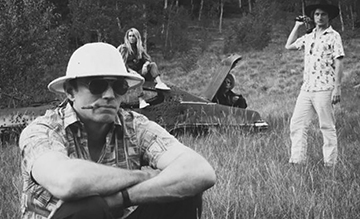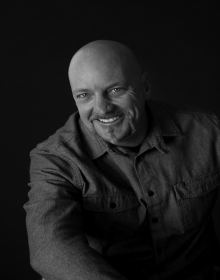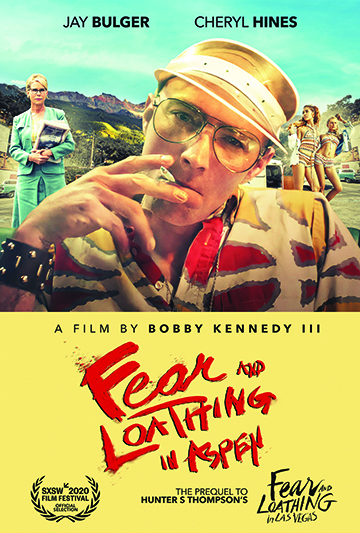“When the going gets weird, the weird turn pro.”
- Hunter S. Thompson
Fear and Loathing in Aspen — a forthcoming film set in Colorado’s most notorious mountain town — is packed with parallels to current issues, rich with the warm, grainy texture of 20th Century celluloid, and thick with finely tuned, bittersweet irony.
Unlike predecessors, this film offers a more subtle, nuanced interpretation of the outlandish escapades of the late writer — Hunter S. Thompson. Director Bobby Kennedy III delivers a concise, thoughtful, and well-rounded narrative of Thompson’s 1970 run for Sheriff of Pitkin County, Colorado, on the Freak Power ticket.
In one scene, Thompson (masterfully played by Jay Bulger) says, “The freaks — they’re everywhere … and they can vote.” He continues his commentary on the local counterculture with more poignant observations, “One of the main things I’ve learned out here is there are all kinds of very capable people wandering around with no place to use their energy. If we can put this energy to work, we’ll have a helluva tool on our hands.”
Throughout the piece, Bulger, who bears an uncanny resemblance to his subject, manages to deliver a convincing portrayal of Thompson while somehow avoiding the character tropes, overblown mannerisms, and hyper-exaggerated speech patterns Thompson’s persona has elicited from those who have portrayed him in the past. Here, viewers are treated to a glimpse into the psyche of a deeply complex character without having to endure the gallivanting around and flailing about of cinematic forebears. Rather, Bulger delves deeper into the humanity of the character, using a somewhat even-keeled anchor point to mount emotional plunges and manic ascents.
Visually, the film pays on-target homage to the wobbly, hand-held 8mm footage that captured many moments of the actual events in the story. Kennedy masterfully rotates between smoothly edited, narrative scenes, and grainy handheld sequences that, were it not for impeccable continuity, could be mistaken for amateur found footage from 1970.
Parallels Abound
Although the story is 50+ years old, the film zaps a cattle prod to a number of today’s hot-button issues. Thompson’s Freak Power party runs the very essence of a grassroots political campaign, echoing current political concerns such as voter reluctance, voter suppression, and election fraud. Meanwhile, the “freaks” of the Aspen Valley — fringe-dwelling refugees of the status-quo — are eerily reminiscent of the drug-addled tent-dwellers of today’s Denver, although in the movie they represent heroism, positive change, and social evolution. And then, there are the conservative gentrifiers who are systematically overtaking Aspen and making Thompson’s proposed utopia an all-but-impossible pipedream. Given the overrun, overdeveloped, and overpriced state of Pitkin County today, it makes you wonder how vastly different that sector of Colorado would look had Thompson been victorious.
A Brazen Platform
As one would expect, his platform was as sweeping and rebellious as the man’s reputation. “We will sod the streets at once” he begins. “Rip up all city streets with jackhammers and use the junk asphalt, after melting, to create a huge parking and auto storage lot on the outskirts of town. We will change the name of Aspen, by public referendum, to Fat City, to prevent land rapers, greedheads, and human jackals from capitalizing on the name ‘Aspen.’ Aspen, Colorado, would no longer exist, and the psychic alterations of this change would be massive in the world of commerce. By this approach, making hundreds or even thousands of individuals personally responsible for protecting the animals, fish, and birds that live here, we would create a sort of de facto game preserve without the harsh restrictions that will be forced on us if these bloodthirsty geeks keep swarming in here every autumn to shoot everything they see.”
Acerbic, To Wit
Alas, the irony that Bobby Kennedy III deals out to viewers is deeply poetic. He skillfully helms a cinematic vehicle that is clearly aimed at the establishment, the status quo, the Good Ol’ Boys Club that his grandfather and great uncle (Bobby and John F. Kennedy) attempted to topple.
While the outcome of Thompson’s run for Sheriff of Pitkin County is well known, Fear and Loathing in Aspen is not to be dismissed for simply retelling the bittersweet parable of an American underdog. Lest it be forgotten, this country was founded by rebels with revolutionary thinking and radical solutions. As Bulger soliloquizes at the end of the third act, “If you ever get the chance to sweep the fatbacks off their feet, don’t f@*k it up.”
Fear and Loathing in Aspen is indie filmmaking at its finest, hearkening back to the glorious cinematic movement of the 1990s where formula, big name actors, plotless blather, and CGI sensory overload were not the order of the day. This film deserves a fair shot at the permaculture, for sheer entertainment value as well as historical significance. Should you crave a cinematic experience that requires a bit of thinking, a fair modicum of empathy and a healthy sense of the ridiculous — this film is for you.




